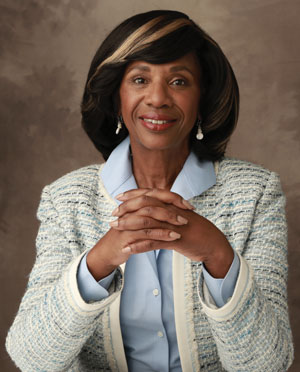President's Message
Justice for all ... who can afford it

Photo of ABA President Paulette Brown by Marc Hauser.
America is supposed to adhere to the principle of "equal justice under law," a concept dating back to ancient Greece and embedded in our society through the 14th Amendment. The phrase is so important to our legal system it is engraved on the U.S. Supreme Court building.
But today, in far too many instances, an individual's access to equal justice is based less on principle and more on ability to pay. Financial penalties—fees, fines and bail—have rendered justice unjust.
Fees and fines that ignore a defendant's ability to pay place an unfair burden on people of lesser means. Minor infractions can result in fees that spiral into thousands of dollars, and contribute to the United States incarcerating more individuals than any developed country. Bail set without consideration of financial circumstances results in the detention of the poorest, rather than most dangerous or highest flight risks as intended.
In December, I attended a White House meeting titled "A Cycle of Incarceration: Prison, Debt and Bail Practices." A bipartisan, eclectic group of academics and stakeholders were gathered to discuss the issue and develop an agenda for change. U.S. Attorney General Loretta Lynch spoke at the meeting about "the criminalization of poverty" where a person's financial standing, not actions or deeds, determines justice. She explained how this situation breeds mistrust and erodes faith in our government and law enforcement.
Former Attorney General Robert F. Kennedy said in 1962, "If justice is priced in the marketplace, individual liberty will be curtailed and respect for law diminished." We are seeing this respect diminished throughout our country. One such place, Ferguson, Mo., was the subject of a U.S. Department of Justice investigation.
In March 2015 the Justice Department's Civil Rights Division released its report on the Ferguson Police Department and found that the city focused its municipal court operations on revenue generation, not public safety. It routinely imposed excessive fines, arrested low-income residents for failure to appear or make payments, and used unlawful bail practices, resulting in unnecessary incarceration.
The report referenced the case of a 67-year-old woman who received two traffic tickets in 2007 totaling $152. After more than eight years of fines and penalties—including two arrests and six days in jail—she had paid the city $550 and owed $541 more.
Ferguson is not an anomaly. Across the country, nearly two thirds of all inmates in county jails are awaiting trial at a taxpayer cost of $9 billion. After release on bail or probation, many must pay private companies to monitor them. In South Carolina, a defendant has to pay almost $300 a month for an ankle-monitoring bracelet or return to jail.
The office of the public defender was formed to assist individuals unable to afford a private lawyer. Yet in too many instances, indigent defendants are required to pay a fee to utilize a public defender, placing the promises of Gideon v. Wainwright in a precarious position.
But there are alternatives. In Newark, New Jersey, Judge Victoria F. Pratt presides over Municipal Court Part Two and uses procedural justice rather than incarceration. She routinely orders individuals to write essays to examine why they committed an infraction and how they can change their lives.
Judge Alex Calabrese at the Red Hook Community Justice Center in Brooklyn, New York, concentrates on the underlying problem of a defendant's behavior and crafts solutions such as service to repay the community. These courts focus on fairness. Defendants respond when treated with dignity. These courts save money, reduce pretrial incarcerations—which can average $19,000 per case—and improve recidivism rates.
John Jay, the first Chief Justice of the United States, said, "Justice is indiscriminately due to all, without regard to numbers, wealth or rank." To live up to these words, courts need to save money through innovation rather than extracting it from poor defendants. Only then can justice truly be equal for all.
• Follow President Brown on Twitter @Brown4Lawyers.
This article originally appeared in the March 2016 issue of the ABA Journal with this headline: "Justice for All … Who Can Afford It: Use of excessive fees, fines and bail results in unequal access to justice for the poor."



